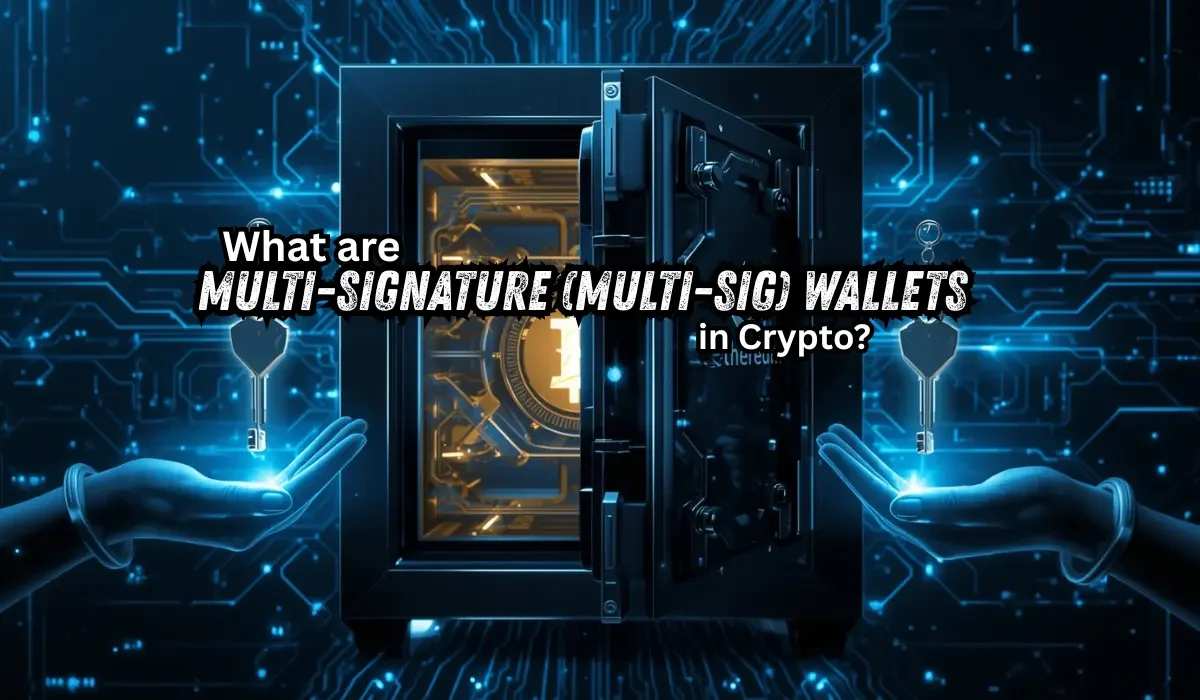What are Multi-Signature (Multi-Sig) Wallets in Crypto?

In the realm of crypto, where security is of prime importance, multi-signature (multi-sig) is emerging as an inevitable feature. Multi-signature is commonly used by crypto wallets, where multiple signatures by different cryptographic private keys are required to make a transaction.
Multi-signature is beneficial, particularly to persons and businesses that use cryptocurrencies. However, they are not completely free of complexities and risks.
In this article, you will read in detail about the working advantages and disadvantages of multi-signature wallets. You will also understand the differences between single-signature and multi-signature wallets.
Working of Multi-Signature Wallets
In crypto wallets, whether it is a single-signature or a multi-signature wallet, signatures are required to validate transactions. In single-signature wallets, only the transaction initiator’s signature is necessary. But in multi-signature wallets, signatures from multiple users are required to give their consent in the form of signatures.
The wallet generates a multi-signature address, and a certain number of addresses from the multi-signature group have to sign the transaction using their public keys. The specific programming used will aggregate these signatures into one and approve the transaction.
Types of Multi-Signature Wallets
Multi-signature wallets are divided into several types based on the number of signatories.
- 2-of-2: This wallet requires two private keys and two signatories to authorize a transaction. It can be used in a joint account where the consent of both account holders is necessary to make a transaction.
- 2-of-3: These types of wallets will have three private keys but only two signatories. These wallets are used for business purposes.
- 3-of-5: This wallet uses five private keys, but only requires three signatures out of the five. It is used by corporate treasuries and large businesses for high-level security.
There are also other multi-sig combinations, such as 5-of-10 or 3-of-7.
Differences between Single-Signature and Multi-Signature Wallets
The table below shows the major differences between single-signature and multi-signature wallets.
| Single-Signature Wallets | Multi-Signature Wallets |
|---|---|
| They require only one signature. | They require multiple signatures. |
| They are simple and help make fast transactions. | They are complex and slow, as they require the consent of multiple signatories. |
| Security is low or can be compromised. | Security is high as transactions cannot be done without the approval of all signatories. |
| Accountability is limited. | Accountability is high as multiple signatories need to consent to make a transaction. |
| Privacy is more important as users can keep their private keys secure. | Individual privacy might be compromised as multiple signatories are involved. |
| They are more vulnerable to scams and theft. | The possibility of scams and theft is low. They are more immune to phishing threats. |
Advantages of Multi-Signature Wallets
Multi-signature wallets are quite advantageous for users who prioritize security and accountability. Here are the major advantages of multi-signature wallets that you should keep in mind.
- No single point of failure: With multi-signature wallets, there will not be a single point of failure, as approval of multiple private keys is required. That means a hacker cannot tamper with a single key and conduct any fraud.
- Ideal for Collaboration: Multi-signature wallets are ideal for collaboration in cases such as businesses, large corporations, or joint ventures where there are multiple stakeholders.
- Accountability and Transparency: Since multiple private keys are involved, the accountability of each signatory is high. All the signatories are aware of the transactions involved, which means that all the processes are transparent.
- Security: Multi-signature wallets are more secure. They have the resources necessary for the identification and mitigation of security threats.
- Less Chance for Human Errors: There is less chance of human-made errors because multiple signatories check and verify the processes before initiating a transaction.
Disadvantages of Multi-signature Wallets
While multi-signature wallets are hugely beneficial in several ways, they also have certain disadvantages.
- Complexity: Making a transaction on a multi-signature wallet is quite complex due to the number of stakeholders involved. Managing the large number of keys is technically complex, too.
- Slower Transactions: Unlike single-signature wallets, transactions on multi-signature wallets are slower, as approval from multiple stakeholders is needed.
- Higher Fees: The Transaction fee is high for multi-signature wallets as they need more resources to store the information about multiple private keys.
- Compatibility Issues: Multi-signature wallets are not compatible with all blockchains or wallet providers. This affects interoperability.
- Legal Uncertainties: Laws and regulatory frameworks regarding multi-signature wallets are not fully formulated in all parts of the world. This can cause uncertainties in their operation.
The Bottom Line
Multi-signature wallets are beneficial for digital currency transactions that need a high amount of security and care. These wallets are used by joint account holders, large business entities, and corporations that need approval from multiple stakeholders to conduct a transaction. While they have many advantages, you should also be mindful of their disadvantages.
Before you use a multi-signature wallet, do your own research to understand its specific utility in your case so that you can navigate all its disadvantages.
Frequently Asked Questions (FAQs)
Fund recovery is a hefty task in the case of multi-signature wallets because it requires importing of multiple recovery phrases of different private keys. If some of these keys are lost, it is impossible to recover the funds.
Even though highly secure, multi-signature wallets can be hacked if the keys are not stored and managed properly. There can be insider threats where a majority of the signatories can collude and steal funds.
Gnosis Safe, Casa, CoPay, and Armory are some of the best multi-signature wallets in 2025.
Crypto & Blockchain Expert
